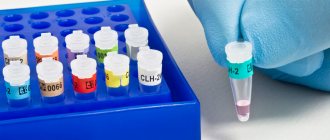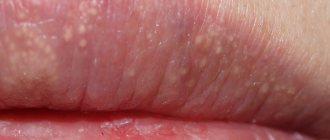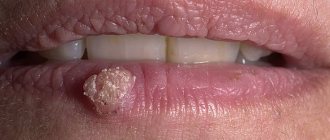Stomatitis
Stomatitis is an inflammation of the oral mucosa, which can occur in mild and severe forms. The development of pathology is possible at any age. Risk factors for the appearance of white pimples on the inside of the lip include insufficient hygiene, smoking, and lack of iron in the diet. In this case, genetics and gender do not matter.
Causes of Fordyce granules
This is a light rash that can form on the lips, cheeks, genitals and groin area, on the chest, oral mucosa, and other places. At the moment they are not considered a pathology, but sometimes cause discomfort. Another name for granules is seborrheic cysts. They are not transmitted by contact and are more of an aesthetic defect.
Most often, their occurrence occurs during puberty, when hormonal changes occur in the body. It is believed that the formation of these white pimples on the lips may be due to the close location of the sebaceous glands to the surface of the skin.
There are the following reasons for the appearance of white pimples on the lip:
- smoking;
- abnormal location of the sebaceous glands;
- improper care;
- hormonal disorders;
- narrowing of the excretory canals of the sebaceous glands.
This rash may resolve on its own.
What to do if pimples appear on your lips?
If you have pimples on your lips, you shouldn’t immediately run to the pharmacy for saving ointment. Despite popular misconception, the term “acne” does not refer to any specific disease. The rash can be a manifestation of many dermatoses. Only a specialist, having studied her character and collected anamnesis, will be able to prescribe adequate treatment.
With acne, inflammation around the lips is usually rare, but if the rash around the lips turns out to be acne, the doctor may prescribe topical antibiotics18. These include Clindovit® gel. Its main active ingredient is clindamycin phosphate, which upon contact with the skin is hydrolyzed to form clindamycin6. The drug is active against propionibacteria and helps reduce the level of free fatty acids6. To reduce the risk of developing antibiotic resistance, it is recommended to combine the use of Clindovit® with azelaic acid preparations (Azelik® gel) or benzoyl peroxide28.
Ulcers caused by trauma
The main reason for the appearance of ulcers when the mucous membrane is injured is infection in the wound. Most often, white rashes occur due to the habit of biting nails or the tip of a pencil or pen.
Fans of seeds and hard toothbrushes may also be at risk. Many people believe that hard bristles remove plaque better. Actually this is not true. If you carefully brush your teeth with such a brush, you can damage the enamel, gums and cause inflammation.
Other causes of mucosal injury:
- uncomfortable dentures;
- braces or other orthodontic structures;
- habit of unconsciously biting your cheek or tongue;
- exposure to mucous membranes with drugs or acids.
How to treat?
It is enough to remove the irritating factor and wait 1 - 2 weeks. Usually the ulcers go away on their own. If this does not happen, it is recommended to consult a doctor.
How to get rid of unpleasant symptoms at home
It is not worth treating at home without seeing a doctor. However, there are ways that you can resort to to reduce discomfort:
- If your lips become inflamed due to the sun or cold, it is advisable that they are always covered with a protective layer of balm.
- For severe itching and burning, which occur in almost all forms of cheilitis, cold compresses will help. Before applying them, the skin is covered with a layer of balm so that the lips are treated simultaneously with the reduction of pain.
- If your lips are red and covered with cracks, sores or any other open wounds, you need to make sure that bacteria do not get into them. The surrounding skin and teeth should be treated with a cotton pad soaked in hydrogen peroxide or Miramistin. Special antiseptic ointments will have the best effect.
- If pain and itching are unbearable, painkillers can be used. Ointments with a cooling effect will have the same effect.
All methods of folk treatment for cheilitis will be useless if you resort to them thoughtlessly - without consulting a doctor. In most cases, inflammation, redness and itching of the lips are harmless. Such symptoms can go away even without therapy, but sometimes they indicate dangerous diseases, so medical help should not be neglected.
Diagnosis of a tumor by a doctor in a hospital
What does lip cancer look like? It could be a small ulcer or a widespread tumor. Doctors at the Oncology Clinic of the Yusupov Hospital make a diagnosis of lip cancer based on the patient’s complaints, the results of an external examination and additional studies. The oncologist carefully examines and palpates the lips, cheeks, gums and regional lymph nodes. When examining the red border of the lips, skin and mucous membrane, use a magnifying glass.
How to identify lip cancer? Further examination is carried out using instrumental and laboratory diagnostic methods:
- Ultrasound examination;
- X-rays of the lower jaw;
- Panoramic tomography;
- Cytological examination of material obtained by taking fingerprint smears from the surface of the ulcer or histological examination of tissue obtained during a biopsy.
For lip cancer with lymphatic metastasis, a biopsy of the lymph nodes is performed. To exclude hematogenous metastases, chest X-ray and ultrasound examination of the abdominal organs are used. When the diagnosis of lip cancer is confirmed, an X-ray examination of the chest organs, general clinical and laboratory examination (electrocardiography, blood and urine tests) are performed.
A PET-CT study (positron emission computed tomography) is prescribed for the following purposes:
- Determining the stage of lip cancer;
- Assessment of response to treatment;
- Detection of disease relapse during the observation period.
PET-CT is an innovative method that combines the capabilities of computer technology and radiology. At the Yusupov Hospital, it is used not only to diagnose lip cancer, but also to monitor tumor development and evaluate the outcome of treatment. Thanks to PET-CT, radiologists have the opportunity to very accurately carry out radiation treatment, significantly reduce the irradiation area, and minimize the impact on healthy organs and tissues.
In many cases, the use of PET-CT excludes a number of additional studies in the future. This allows patients of the Yusupov Hospital to save time and money. The issue of the need to use this method is decided individually for a specific patient at a meeting of the expert council with the participation of professors and doctors of the highest category. A comprehensive examination of patients using the latest diagnostic equipment, the use of modern methods of performing laboratory tests using high-quality reagents allows oncologists at the Yusupov Hospital to obtain reliable results and provide adequate therapy for lip cancer at an early stage.
Can I cope on my own or should I consult a doctor?
You can get rid of the problem yourself if a person has knowledge in the field of cosmetology and dermatology. It is best not to try to get rid of the problem yourself , since symptoms may indicate the presence of specific problems in the body that require professional solutions and constant medical supervision.
You should not delay your consultation if there is obvious discomfort when talking or eating. The appearance of discharge or blood from the granules, increasing itching or pain also indicates the need for a medical examination.
Ulcers caused by oral diseases
White sores in the mouth can appear due to diseases of the oral cavity. The most common cause is stomatitis. It comes in several types:
- aphthous;
- herpetic;
- bacterial;
- fungal.
| White ulcers in adults and children occur with aphthous and herpetic stomatitis. This disease can appear due to stress, untreated caries, lack of vitamin C, or overexertion. It is better not to self-medicate, but to immediately consult a doctor. Recommendations, in addition to medications, may include treatment of caries, a balanced diet, stress reduction, etc. |
| There are two separate forms of stomatitis - Bednar's aphthae and Setton's aphthae. The former develop only in a child due to injury to the mucous membrane or poor oral hygiene. Such rashes are also called erosions. Setton's aphthae is a more complex and painful phenomenon. It begins with the appearance of compactions, which then develop into painful ulcers. They most often form on the inside of the cheeks, in the corners of the lips and on the sides of the tongue. |
| Another cause of white sores is gingivitis. In smokers, such rashes are much more common due to the effects of nicotine on the mucous membranes. Those who have poor oral hygiene, reduced immunity and hormonal imbalances are also at risk of encountering gingivitis. If left untreated, it can progress to periodontitis: when the tissue that supports the tooth is affected. And this is a direct path to tooth loss. |
How to treat lips with cheilitis
The most important thing in treating cheilitis is to identify its cause, which is difficult to do without professional help. You'll have to contact a specialist. First, it is better to go to a therapist, and he will then refer you to a specialist doctor.
Typically, treatment for diseases of the lips and skin around the mouth is based on eliminating not the symptoms, but the root cause. It includes lifestyle changes, proper nutrition, and medication.
If the cause of inflammation is an infectious or fungal infection, local drugs are included in the therapy. Typically, patients are prescribed various medicinal ointments for external use, which must be applied to damaged skin several times a day:
- anti-inflammatory – Tetracycline, Erythromycin;
- antifungal – Clotrimazole;
- hormonal – Prednisolone.
To cure lips, you need to influence them not only from the outside, but also from the inside. The skin around the mouth often suffers from a lack of B vitamins, so they are often prescribed in the treatment of lips.
Features of treatment of the disease
After the first examination, the doctor can make a preliminary diagnosis and refer the patient for diagnostics (if necessary). Treatment tactics directly depend on the cause of the cosmetic defect.
Important! If a woman, man or child has white spots under the skin on their lips, you should consult a dermatologist.
Drug treatment
Having found out why the disease developed, the doctor tells how to get rid of white dots on the surface of the lips.
For example, for Fordyce syndrome they use:
- Fenistil gel (costs 385 rubles);
- Akriderm ointment (costs 316 rubles);
- Erius in tablets (costs 600 rubles);
- Suprastin tablets (cost 121 rubles);
- Dexpanthenol ointment (cost 155 rubles);
- D-Panthenol cream (costs 189 rubles).
Fenistil
Akriderm
Erius
Suprastin
Dexpanthenol
D-Panthenol
For herpes, antiviral creams and ointments are prescribed:
- Panavir gel (costs 125 rubles);
- Acyclovir in the form of ointment (cost 25 rubles).
Panavir
Acyclovir
When genital herpes is detected in women and the presence of an infectious process, Acyclovir is prescribed in tablets (cost from 140 rubles).
Acyclovir 400 mg
Acyclovir 200 mg
Traditional methods
If a person is bothered by white spots in the mouth in the lip area, you can use folk recipes:
- A fresh aloe leaf is cleaned of sharp parts and secured with a bandage on the upper or lower lip. The procedure is carried out overnight.
- Lamb fat is melted and rubbed into the place where many white rashes are visible on the lip.
- Wheat grains are chewed, wrapped in gauze and applied to the points on the lip as a compress, secured with film.
- Grind the garlic until mushy. Add vegetable oil and rub into problem areas.
Cosmetic methods
When a wen forms, which looks like white dots on a person’s lip, in beauty salons they can:
- inject into the wen capsule. After some time it will resolve on its own;
- remove the problem using radio frequency radiation.
To eliminate aesthetic problems on the upper and lower lips, they can also offer cryotherapy, electrocoagulation, and laser treatment. If white lumps on the lower and upper lips appear as a result of lip enlargement after injections, the cosmetologist will perform a special massage (for example, with ultrasound) and recommend gymnastics.
Lip contouring: consequences in the form of inflammation
Inflammation cannot be called a direct side effect. Non-sulfated glycosaminoglycan (hyaluronic acid) is completely biologically compatible, but despite this, after its administration the body activates its standard protective reaction. As a rule, biological processes return to normal within a few days and inflammation goes away on its own. But in some cases, redness remains. There are two possible options:
- Along with the puncture, an infection entered the body . But this is not always the cosmetologist’s mistake. The viruses could have been developing for several days, and the injection triggered their launch.
- Autoimmune diseases reacted to the drug injected into the lip area, activating an inflammatory reaction and an increase in connective tissue.
In terms of neutralization, each of the points requires different therapy. In case of infection, you must make an appointment with a doctor to clarify the diagnosis and take pharmacological medications. If an autoimmune disease is to blame, then it is worth undergoing steroid therapy - it effectively reduces the immune response. But only a doctor prescribes the prescription and regimen for taking any medications. Self-medicating the consequences after contouring is extremely dangerous. Instead of reducing inflammation, you can, on the contrary, provoke suppuration and the formation of permanent scars.
Find out which method of correcting scars and stretch marks is optimal for you!
doctor Svetlana Viktorovna Ogorodnikova.
doctor
Treatment of lip cancer
How to treat lip cancer? When treating the disease, oncologists at the Yusupov Hospital take into account many different factors: the patient’s age, histological type of tumor, features of the spread of the tumor. Doctors at the Oncology Clinic provide multidisciplinary treatment for lip cancer:
- Surgical interventions;
- Radiotherapy;
- Chemotherapy.
Regardless of the chosen technique, they affect the lesion or tumor, areas of regional metastasis. For grades I and II of lip cancer, radiation treatment is performed, which includes external radiotherapy and surgery.
Treatment in the initial stages
Squamous cell carcinoma of the lower lip is a common complex tumor process. Its treatment consists of two stages: removal of the main focus and the fight against metastases that have spread to neighboring tissues and organs. Radiation treatment can suppress the development of a tumor focus. The radiologist selects the method of radiation therapy individually, depending on the size of the tumor, stage of the disease, and age of the patient.
Removal using the Krail method
In the initial stage of the tumor, surgeons perform a wedge-shaped excision of the entire thickness of the lip under local anesthesia. In order to remove a defect on the lip, plastic surgery is performed - skin flaps are transferred from the patient's cheek. Removal of the lesion is performed using the Krail technique. The operation is performed at the first and second stages of lip cancer, when the tumor has not spread to nearby tissues. Surgical excision of carcinoma makes sense in the absence of metastases.
The decision to remove a lymph node is made by an oncologist surgeon if the primary tumor process has already been cured or if the lymph node is removed along with the removal of the main lesion. In some cases, surgeons remove the primary cancerous tumor, the affected lymph nodes and the vessels that connect them. The scope of the operation is determined collectively by the clinic's oncologists.
Due to the fact that metastasis can occur in a cross way, the lymphatic apparatus of the suprahyoid region on the left and right is removed. If the oncologist sees that there are cancer metastases in certain lymph nodes, he decides to remove them, and those that are located along the lymph outflow.
Treatment tactics for lip cancer depend on the stage of the disease:
- Preventive surgery at stages I and II of lip cancer is carried out exclusively in cases where it is not possible to control the dynamics of the disease and there are unfavorable prognoses regarding the spread of cancer;
- At stage III, in the absence of metastases, treatment is carried out using a combined effect on the lesion and adjacent areas;
- In case of spread of cancer cells and the presence of single metastases in the lymph nodes, oncologists at the Yusupov Hospital perform combined treatment of lip cancer with subsequent surgery, plastic surgery and surgical correction of the lips;
- In stage IVC, palliative chemoradiotherapy is performed.
Candidates and doctors of medical sciences use innovative methods of treating lip cancer. The presence of modern equipment and competent medical personnel who are attentive to all the wishes of patients allows us to achieve good results in the treatment of lip cancer for many years. Lip cancer, treated in the early stages, is cured in 97-100% of cases. At stage III, 67-80% of patients can be cured. In the fourth stage of cancer and repeated relapses, complete recovery occurs in 55% of cases.
Stages
Currently, the generally accepted classification of lip cancer is TNM (T-size of the tumor, N-damage to the lymph nodes, M-metastases). Based on the size of the tumor, there are 4 stages of lip cancer.
Table 1. Stages of lip cancer
| Stage | Tumor size |
| T1 | Less than or equal to 2cm |
| T2 | More than 2-4cm |
| T3 | More than 4cm |
| T4a | The tumor grows into the cortical layer of the bone, tongue muscles, maxillary sinus and skin |
| Т4в | The tumor grows in the bed of the masseter muscle, the pterygoid process, the internal carotid artery and the base of the skull |
If on the affected side there are single enlarged lymph nodes, the size of which is less than 3 cm, this is stage N1 lip cancer. At stage N2, enlarged lymph nodes are detected on the affected side, the diameter of which is more than 3 cm. If the patient has single enlarged lymph nodes on the affected side measuring 3-6 cm in size, this is stage N2a of lip cancer. At stage N2, oncologists determine multiple metastases to the lymph nodes. Their size is equal to or greater than 6cm. In the presence of bilateral metastases in the lymph nodes measuring 6 centimeters, they speak of the N2c stage of lip cancer. If the diameter of the lymph nodes exceeds 6 cm, this is stage N3 of the disease.
In the absence of distant metastases, oncologists determine stage M0 of lip cancer, if there are distant metastases - M1, in the case of distant metastases that cannot be assessed - MX. The diagnosis of “early stage lip cancer” is made in the presence of a tumor less than or equal to 2 cm, the presence of single enlarged lymph nodes less than 3 cm on the affected side and the absence of distant metastases. This is T1 N1 M0.
Prevention of deviation
To prevent white spots from appearing on the lips after treatment, it is necessary to take preventive measures. This is evidenced by numerous reviews from experts.
They advise:
- give up alcohol and smoking;
- avoid promiscuity and unprotected sex;
- do not neglect the rules of personal hygiene;
- take vitamins and immunostimulants;
- diversify your usual diet by including a lot of fresh fruits, vegetables, herbs, dairy products, white and red meat, vegetable and animal fats;
- ensure normal drinking regime;
- prevent obesity;
- avoid emotional turmoil;
- have a good rest;
- actively engage in sports;
- avoid overwork.
Before figuring out how to remove white spots that appear in the lips or mouth, you need to find out what disease caused them. Such manifestations generally do not mean serious health problems, but a medical consultation would not hurt.
Lip cancer: treatment at Yusupov Hospital
Effective treatment of lip cancer in Moscow is carried out by doctors from the oncology clinic of the Yusupov Hospital. Oncologists have many years of experience in treating malignant neoplasms of the lip. Surgeons are fluent in surgical techniques. The cost of surgery is lower than in other oncology clinics in Moscow, despite the high level of qualifications of doctors and modern equipment.
Radiotherapy is carried out using modern radiation installations from leading European and American manufacturers. In order to undergo a course of effective treatment for lip cancer at an affordable price, call the Yusupov Hospital. After the operation, surgeons at the Oncology Clinic perform lip plastic surgery using innovative surgical techniques.
Herpes symptoms
Currently, most people are infected with some type of herpes virus. It is believed that antibodies to the Epstein-Barr virus can be detected in almost every adult (up to 98% of the adult population of the Earth). Antibodies to herpes simplex virus type 1 are detected in 90% of the adult population of large cities.
However, as a rule, carriage of a herpes infection does not lead to the development of the disease. The herpes virus is activated when the body's defenses decrease. The weaker the immune system, the more likely the virus is to transition from dormant to active.
That is why the herpes simplex virus type 1 is popularly called “cold on the lip.” The appearance of herpetic rashes is usually preceded by a common runny nose, that is, ARVI. The disease weakens the immune system, which is what the herpes virus takes advantage of.
Symptoms of herpes simplex
When infected with herpes simplex virus type 1, the incubation period ranges from 1 to 8 days. Typical symptoms: chills, fever up to 39-40°C, headache, general weakness and drowsiness. Then redness appears, in place of which characteristic bubbles form. When the oral mucosa is affected, blisters are usually found on the inside of the lips, tongue, and less often on the palate, palatine arches and tonsils. Bubbles appear at the site where the virus enters the mucous membrane. Subsequently, the bubbles burst, leaving behind painful erosions.
The disappearance of symptoms does not mean complete recovery. The virus remains in the body and after some time (in conditions of decreased immunity) a relapse of the disease is possible. Relapses can occur 1-3 times a year for several years and even decades.
Symptoms of genital herpes
The incubation period of genital herpes lasts from 1 to 10 days, after which itching (burning) may be observed in the areas of future rashes. After which swelling appears, and then groups of bubbles appear on the mucous membranes of the genital organs. The inguinal lymph nodes are enlarged. The blisters burst and erosions and ulcers form in their place. The process can last from two to five weeks.
Relapse of the disease is possible within two weeks after the initial lesion. Relapses occur in at least half of those who have recovered from the disease.










